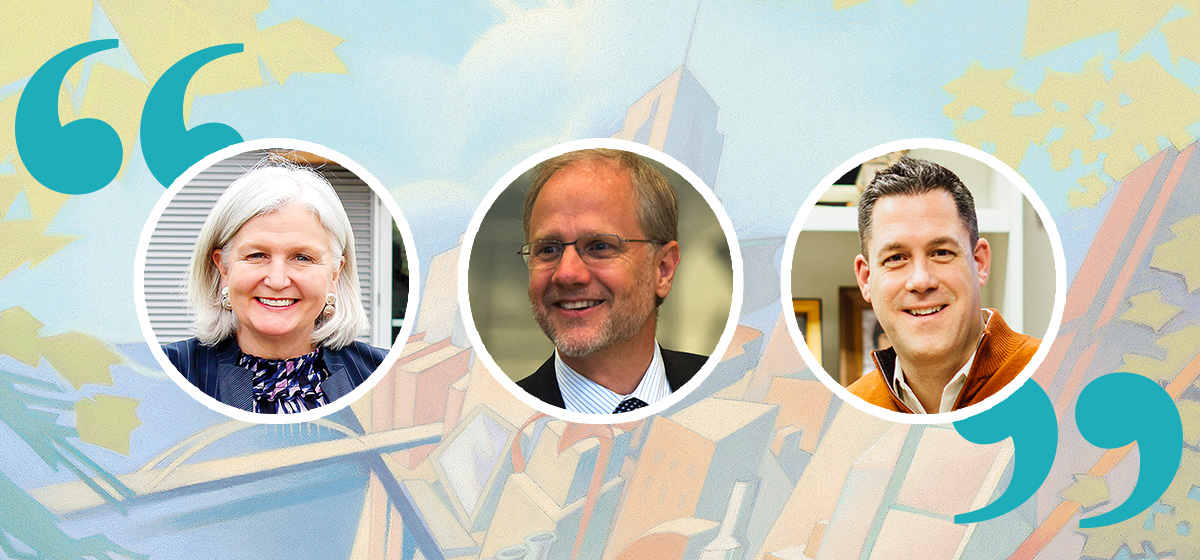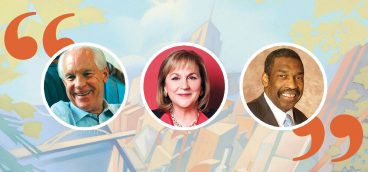Bold Action Needed: Lisa Schroeder, Grant Oliphant, Gregg Behr

At a time when the Pittsburgh region is continuing to lose population and has been seeing regional job losses the past few months, we asked a group of regional leaders to respond, in 200 words or less, to this question: What action do we need to take to create the kind of growth, vitality and dynamism that will stem our population loss and catalyze a strong future?
Lisa Schroeder—President and CEO, The Pittsburgh Foundation
We cannot rest on the laurels we have rightly earned in spurring an urban transformation that exceeds expectations, because too many of our neighborhoods and outlying communities are suffering starkly from under population and a dearth of basic services. We will not survive and thrive unless we connect our citizens—all of them—with viable employment (and a way to get there), safe affordable housing, robust K–12 education and health care. As broad as is the scale and scope of the need, we have a proven history of tackling seemingly insurmountable problems through an intricate network of collaborations and innovations. (Having left Pittsburgh and now returned, I have learned how special and unusual this community DNA really is.) Let’s now push the boundaries of our attention outward to create a metropolitan hub-and-spoke model of smaller scale delivery systems. If we can meet basic needs, quality of life will be enhanced by the assets we already have: a plentiful stock of housing, beautiful parks, hills and riverfronts, affordable entertainment, cultural attractions and quality higher education. My dream: We are the city that beat back the wealth-and-exclusivity gap—a really nice place to live that is affordable. And who could resist moving to Pittsburgh then?
Grant Oliphant—President, The Heinz Endowments
If we want to succeed in creating a legacy of hope and opportunity now, for our children and future generations, we must learn to be better at building a sustainable economic base for our Pittsburgh region. Many technology and research companies have either opened or expanded their presence in Pittsburgh recently—part of a booming sector that according to the Bureau of Labor Statistics has added 26,000 jobs to our region since 2007, the fastest growing sector of our economy.
While these companies are bringing good paying jobs to our region, the benefits aren’t reaching everyone, and we need to act to ensure that more of our citizens have access to higher wage employment—and that the knowledge we generate in Pittsburgh is commercialized here rather than in Silicon Valley or elsewhere. In fact, a 2016 Brookings Institution report showed that for the amount our region invests in research and development—two-and-a-half times the national average—Pittsburgh should have 9,000 more jobs in software development and 5,000 additional jobs in the life sciences.
Creative investment and financing, talent attraction and workforce development programs need to improve in establishing an entrepreneurial ecosystem to capture the economy of the future—one that is engaged in science, research, technology and innovation. We need to remove racial barriers so that all may benefit. And we must continue to reduce environmental pollution that places our region at a disadvantage compared with other cities.
Gregg Behr—Executive Director, The Grable Foundation
I love nearly everything about Pittsburgh. I feel lucky to have been raised here, and I’m grateful now to be raising my family here. There is goodness at the core of this place. Public television, Days of Caring, #bethekindkid… such examples of goodness could spring forth only from a place that large numbers of gracious and generous people call home.
But, Pittsburgh, we have to reckon with everything about who we are—the lovely and the unlovely. And this place isn’t just Mister Rogers’ Neighborhood. Not widely touted (at least not around here) is another label we’ve acquired along the way: one of America’s most racist places. Five years ago, a study of Google search data placed us right smack in the middle of America’s most racist corridor, extending from eastern Tennessee to northern New York. Pittsburgh isn’t only the Paris of Appalachia; it’s as if we’re also the capital of a modern-day Confederacy.
We can’t explain away millions of horrible online search results. This is us. And how do we explain our mark as one of America’s most dismal places for non-whites? Just last year, our city’s own Gender Equity Commission laid bare our failing, as the lead sentence in the Post-Gazette’s coverage made plain: “Pittsburgh’s black residents could move to almost any other U.S. city of comparable size and have a better quality of life.” This is horrifying. And this is us, too.
We have justice to achieve, forgiveness to earn and welcoming to sow. We need to enlist every municipality to implement its own Welcoming Pittsburgh strategy. We need to recruit Vibrant Pittsburgh ambassadors in every workplace, every school and every house of worship. We need to hang No Place for Hate signs on every entry point in every building across western Pennsylvania.
And what we probably really need is a Pittsburgh version of South Africa’s Truth & Reconciliation Commission. Together, we need to talk openly and honestly about the personal and systemic wrongs for which we are responsible.
To quote Mister Rogers, “Anything that’s human is mentionable, and anything that is mentionable can be more manageable.”
So, let’s reckon with who we are, Pittsburgh. Honestly. Publicly. Boldly.







